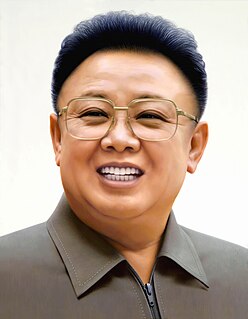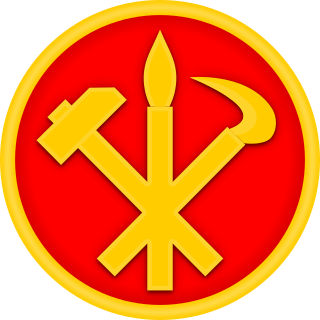
The Korean Central News Agency (KCNA) is the state news agency of North Korea. The agency portrays the views of the North Korean government for both domestic and foreign consumption. It was established on December 5, 1946 and now features internet coverage.

General Federation of Trade Unions of Korea is the sole legal trade union federation in North Korea. GFTUK was formed on November 30, 1945 as the General Federation of Trade Unions of North Korea. In January 1951, it was reorganized and adopted its current name. The chairman of the central committee of GFTUK is Pak In-chol.

Songun (선군정치/先軍政治) is the "military first" policy of North Korea, prioritizing the Korean People's Army in the affairs of state and allocation of resources. "Military first" as a principle guides political and economic life in North Korea, with "military-first politics" dominating the political system; "a line of military-first economic construction" acting as an economic system; and "military-first ideology" serving as the guiding ideology.

Pak Song-chol or Park Sung-chul was a North Korean politician who served as Premier of North Korea from 1976 to 1977. He succeeded Kim Il. He also served as foreign minister from 1959 to 1970.

The Workers' Party of Korea is the founding and ruling political party of North Korea. It is the largest party represented in the Supreme People's Assembly and coexists de jure with two other legal parties making up the Democratic Front for the Reunification of the Fatherland. However, these minor parties are completely subservient to the WPK, and must accept the WPK's "leading role" as a condition of their existence.

The death of Kim Jong-il was reported by North Korean state television news on 19 December 2011. The presenter Ri Chun-hee announced that he had died on 17 December at 8:32 am of a massive heart attack while travelling by train to an area outside Pyongyang. Reportedly, he had received medical treatment for cardiac and cerebrovascular diseases. During the trip though, he was said to have had an "advanced acute myocardial infarction, complicated with a serious heart shock".

The Korean Children's Union is the precursor to the Kimilsungist-Kimjongilist Youth League of North Korea contributing to North Korean youth movement and pioneer movement. It is for children aged six to fifteen and is a political organisation linked to the Workers' Party of Korea. Its uniformed branch is known as the Young Pioneers, which admits children and pre-teens ages nine to 15. The organization operates chapters in elementary and secondary schools nationwide. It teaches children about the Juche Idea, and the ideologies behind the North Korean system. Youth above age 15 may join the Kimilsungist-Kimjongilist Youth League.

The Secretariat of the Workers' Party of Korea, formely known as the Executive Policy Bureau (2016–21), manages the work of the Politburo of the Workers' Party of Korea and its Presidium. The General Secretary leads the work of the Secretariat, and the body is composed of several members.

The Order of Kim Jong-il is a North Korean order named after Kim Jong-il, the former leader of North Korea.

The 7th Congress of the Workers' Party of Korea (WPK), the ruling party of North Korea, was held on 6–9 May 2016.

The Rules of the Workers' Party of Korea is the by-laws of the Workers' Party of Korea (WPK). It sets the rules of the organization and membership of the party. According to the rules, the WPK Congress is the highest body of the party and it, along with the WPK Conference, can amend the rules. The rules defines the character, task, and methodology of the party. According to it, the Party strives to impose communism on the whole of the Korean Peninsula. Recent revisions of the rules have defined Kimilsungism–Kimjongilism as the ideology of the party.

The Socialist Women's Union of Korea is a mass organization for women in North Korea. Founded in 1945 as the North Korea Democratic Women's League, it is the oldest and one of the most important mass organizations in the country. The Union has committees on every level of administrative divisions of North Korea, from ri (village) all the way up to provinces.

The Propaganda and Agitation Department, officially the Publicity and Information Department, is a department of the Central Committee of the Workers' Party of Korea (WPK) tasked with coordinating the creation and dissemination of propaganda in North Korea. It is the highest propaganda organization in the country.

Kim Jong-un has been the supreme leader of North Korea since the death of Kim Jong-il, the previous leader and his father.

Chongnyon Jonwi is a daily newspaper in North Korea. It is the official organ of the Central Committee of the Kimilsungist-Kimjongilist Youth League. It is one of the three most important newspapers in the country, the other two being Rodong Sinmun and Joson Inmingun. Chongnyon Jonwi is particularly known for jointly publishing New Year editorials with the two papers under the rule of Kim Jong-il. The editor-in-chief is Choe Sun-chol.
Choe Hwi is a North Korean politician. He is a Vice Chairman of the Workers' Party of Korea (WPK) and the chairman of the State Physical Culture and Sports Guidance Commission. Choe's portfolio as the Vice Chairman of the party covers workers' and social organizations affairs. Choe is also an alternate member of the Politburo of the WPK, member of the Central Committee of the WPK, and a deputy to the Supreme People's Assembly.
The Workers' Party of Korea Publishing House is the principal publishing house of the Workers' Party of Korea. The publishing house is under the control of the party's Propaganda and Agitation Department. It was founded in October 1945 in Pyongyang, where it is still based. It is one of the two main publishers in North Korea, the other one being the Foreign Languages Publishing House.
Ri Il-hwan is a North Korean politician, a member of the Political Bureau of the Central Committee of the Workers' Party of Korea (WPK). He is currently the director of the Propaganda and Agitation Department (PAD) of the party.

The 8th Congress of the Workers' Party of Korea was held at the April 25 House of Culture in Pyongyang from 5 to 12 January 2021. A total of 7,000 people participated in the congress including 5,000 delegates.



















